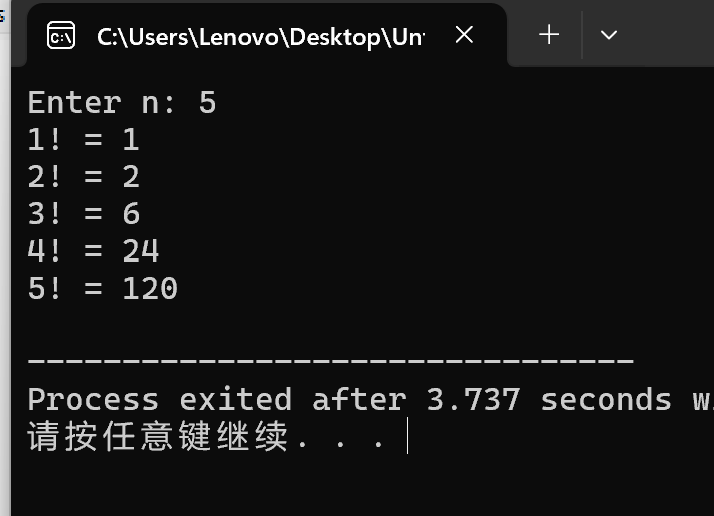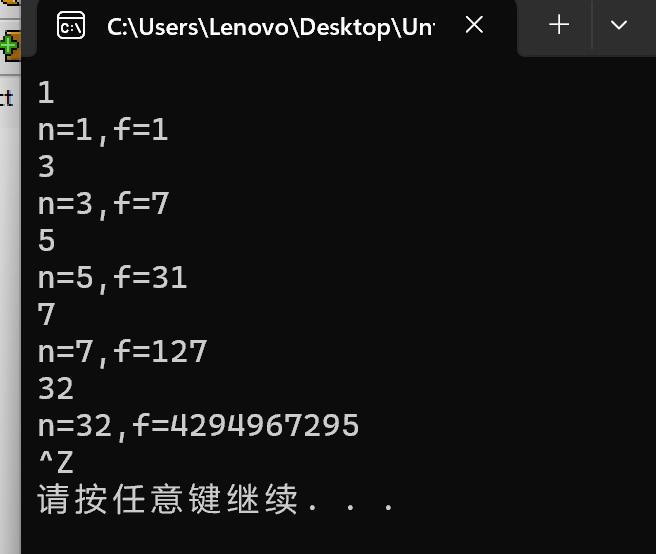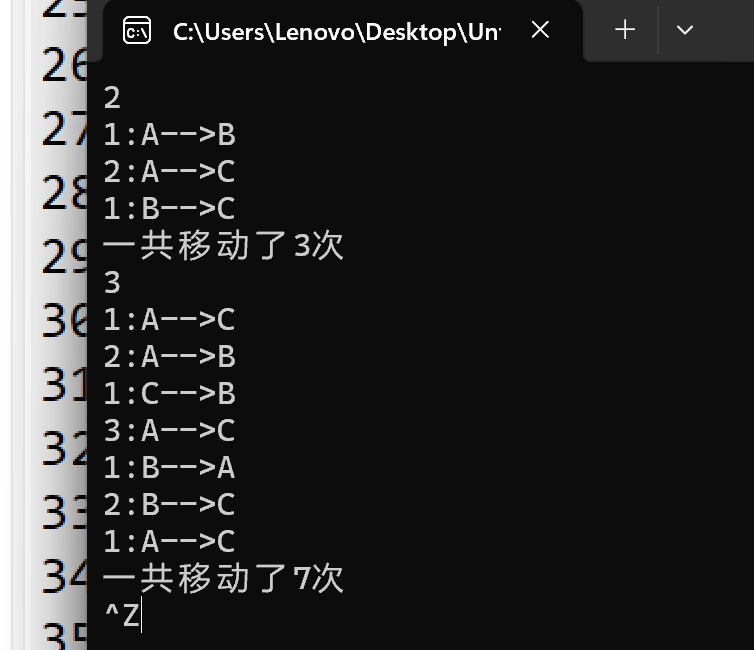实验三
#include <stdio.h> #include <stdlib.h> #include <time.h> #include <windows.h> #define N 80 void print_text(int line, int col, char text[]); void print_spaces(int n); void print_blank_lines(int n); int main() { int line, col, i; char text[N] = "hi, April~"; srand(time(0)); for(i = 1; i <= 10; ++i) { line = rand() % 25; col = rand() % 80; print_text(line, col, text); Sleep(1000); } return 0; } void print_spaces(int n) { int i; for(i = 1; i <= n; ++i) printf(" "); } void print_blank_lines(int n) { int i; for(i = 1; i <= n; ++i) printf("\n"); } void print_text(int line, int col, char text[]) { print_blank_lines(line-1); print_spaces(col-1); printf("%s", text); }
实验一

该程序的功能是每间隔一秒在随机的line行第col列打印 hi,April~ ,共打印十个
实验二
#include <stdio.h> long long fac(int n); int main() { int i, n; printf("Enter n: "); scanf("%d", &n); for (i = 1; i <= n; ++i) printf("%d! = %lld\n", i, fac(i)); return 0; } long long fac(int n) { static long long p = 1; p = p * n; return p; }

#include <stdio.h> int func(int, int); int main() { int k = 4, m = 1, p1, p2; p1 = func(k, m); p2 = func(k, m); printf("%d, %d\n", p1, p2); return 0; } // 函数定义 int func(int a, int b) { static int m = 0, i = 2; i += m + 1; m = i + a + b; return m; }


static的功能:保留变量的值,再次运行时 static是上次函数的终止结果。
实验三
#include<stdio.h> #include<stdlib.h> long long func(int n); int main() { int n; long long f; while(scanf("%d",&n)!=EOF) { f=func(n); printf("n=%d,f=%lld\n",n,f); } system("pause"); return 0; } long long func(int x) { long long ans=0; if(x==1) ans=1; if(x>0&&x<33) ans=2*func(x-1)+1; return ans; }

实验四
迭代
#include<stdio.h> #include<stdlib.h> int func(int n,int m); int main() { int n,m; while(scanf("%d%d",&n,&m)!=EOF) printf("n= %d,m= %d,ans= %d\n",n,m,func(n,m)); system("pause"); return 0; } int func(int n,int m) { int s=1,j=0,a=1,b=1,c=1; if(m==0) s=1; else if(m>n) s=0; else { for(j=n-m;n>0;) { a*=n--; if(m>0) b*=m--; if(j>0) c*=j--; } s=a/(b*c); } return s; }
迭代结果
递归
#include <stdio.h> int func(int n, int m); int main() { int n, m; while(scanf("%d%d", &n, &m) != EOF) printf("n = %d, m = %d, ans = %d\n", n, m, func(n, m)); return 0; } int func(int n, int m) { if(m>n) return 0; else if(m==n||m==0) return 1; else{ int s; s=func(n-1,m)+func(n-1,m-1); return s; } }
结果

任务五
#include<stdio.h> #include<stdlib.h> #include<math.h> void hanoi(unsigned int n,char from,char temp,char to); void moveplate(unsigned int n,char from,char to); int main() { unsigned int n; int s; while(scanf("%d",&n)!=EOF) { hanoi(n,'A','B','C'); s=pow(2,n)-1; printf("一共移动了%d次\n",s); } return 0; } void hanoi(unsigned int n,char from,char temp,char to) { if(n==1) moveplate(n,from,to); else { hanoi(n-1,from,to,temp); moveplate(n,from,to); hanoi(n-1,temp,from,to); } } void moveplate(unsigned int n,char from,char to) { printf("%d:%c-->%c\n",n,from,to); }
结果

实验六
#include<stdio.h> #include<stdlib.h> long func(long s); int main() { long s, t; printf("Enter a number: "); while (scanf("%ld", &s) != EOF) { t = func(s); printf("new number is: %ld\n\n", t); printf("Enter a number: "); } system("pause"); return 0; } long func(long s) { int i=1,m=0,j=1; while(s!=0) { i=s%10; if(i%2!=0) { m=m+i*j; j=j*10; } s=s/10; } return m; }
结果



